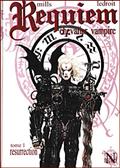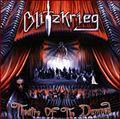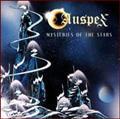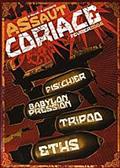NAHEMAH (sp) - The Second Philosophy (2007)

Label : Lifeforce Records / Pias
Sortie du Scud : 29 janvier 2007
Pays : Espagne
Genre : Metal Expérimental Progressif
Type : Album
Playtime : 10 Titres - 60 Mins
Attention, mesdames, mesdemoiselles et messieurs, voici un groupe dont il faudra retenir le nom. NAHEMAH est un produit ibérique, une fois n’est pas coutume dans le Metal, mais cela ne gâche en rien le talent dont font preuve les cinq membres du groupe. Ils nous font découvrir une sorte de Metal Progressif, mais qui n’est en rien comparable avec les mastodontes que sont SYMPHONY X et consort. Le côté progressif est là ici pour le mélange des riffs et la complexité des morceaux, mais en rien dans un déballage technique ou de des guitares et des synthés qui se répondent. Que nenni ! Et les réduire à du Progressif serait aussi une erreur. C’est aussi très aérien, expérimental. On sent des touches de diverses influences, sans qu’aucune ne prenne vraiment le dessus. On pourra citer des passages Noisy, d’autres plus Doom, ou encore Electro, voire même Black Symphonique par moment (et si j’ajoute Néo, c’est trop ?). Mais comment font-ils ? Je ne sais pas. En tous cas, ils le font bien, c’est certain.
L’album est clairement scindé en deux parties. Les cinq premiers morceaux sont un peu plus rentre dedans, même si on n’attend jamais des sommets dans le genre. Des samples omniprésents mais discrets foisonnent. Ils se payent même le luxe d’être originaux (comme celui du début de « Like A Butterfly In A Storm » qui fait penser à un ressort mal huilé) ou bien assez classiques mais entraînants (« Change »). Le chant de Pablo Egido oscille entre des hurlements maîtrisés et du plus bel effet et une voix claire et envoûtante. La batterie se permet aussi quelques excentricités par moment (« Change », toujours) et on voit que Jose Diego maîtrise son sujet. Et c’est là que NAHEMAH est fort. En utilisant des plans simples, ils arrivent à se les approprier et à les détourner pour nous donner une impression d’innovation. Une chose suffisamment rare pour être mentionnée.
Les cinq derniers morceaux sont plus complexes mais aussi plus calmes, si je puis dire. Plus aérien dans l’esprit, plus prompts à nous plonger dans un coma révélateur. Ce n’est pas la partie que j’ai préférée (dans son ensemble), mais on ne peut pas dire que les morceaux m’aient laissé indifférents non plus.
The Second Philosophy est un album qui mérite de l’attention et plusieurs écoutes pour être appréhendé. Même si je suis tombé sous le charme du groupe, ce n’est pas un album que j’écouterai en boucle. Je ne pense même pas pouvoir l’écouter en une seule fois. C’est trop particulier pour ne pas être surchargé d’informations musicales si on ne coupe pas au milieu. Il me fait l’effet de Enemy Of The Sun de NEUROSIS : un album excellent mais peut-être trop à part.
Je ne reçois aucune guelte pour tout ce que je peux écrire sur NAHEMAH. C’est un album de cœur, de tête, d’âme. Un album complet. Vraiment, découvrez NAHEMAH, ça en vaut la peine.
Ajouté : Mardi 17 Avril 2007
Chroniqueur : Wong Li
Score :    
Lien en relation: Nahemah Website
Hits: 15111
|














